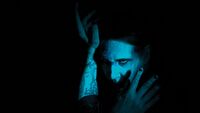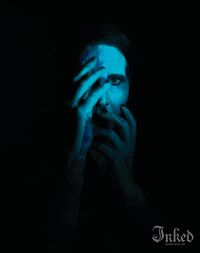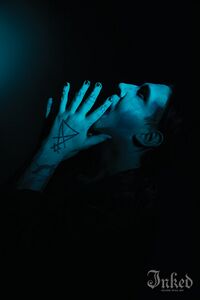Difference between pages "The End (The Doors song)" and "Interview:2020/09/10 Agent of Chaos"
| Line 1: | Line 1: | ||
| − | {{ | + | {{stub}} |
| − | {{ | + | {{Interview |
| − | | | + | | Image = MTc1MzA5ODYwNjIyMDUwNjEx.jpg |
| − | + | | Caption = All photos by Travis Shinn | |
| − | | | + | | Title = Agent of Chaos |
| − | | | + | | Artist = [[Marilyn Manson]] |
| − | | | + | | Date = September 10, 2020 |
| − | | | + | | Source = ''[https://www.inkedmag.com/original-news/marilynmanson Inked]'' |
| − | | | + | | Interviewer = Charlie Connell |
| − | | | + | | Scans = |
| − | | | + | | Audio = |
| − | | | + | | Video = |
| − | | | + | | Discussion = |
| − | | | + | |
| − | + | ||
}} | }} | ||
| − | + | :''We spoke with [[Marilyn Manson]] about his prescient [[WE ARE CHAOS|new album]], the loss of his close friend Norm Love Letters, and collaborating with [[Shooter Jennings]].'' | |
| − | + | Marilyn Manson is the human embodiment of chaos. | |
| − | + | ||
| − | + | Countless twists and turns define his 30-year career, as he has gone from shock rocker to [[Antichrist Superstar|Antichrist]], [[Marilyn Manson paintings|painter]] to [[Marilyn Manson filmography|actor]]. Each stage of Manson’s oeuvre could fill a tome—the only constant is that Manson’s next move is never what you expect it to be. | |
| − | + | For his 11th album, “[[WE ARE CHAOS|We Are Chaos]],” Manson teamed up with an unlikely partner, [[Shooter Jennings]]. The two had met around the time Manson was on “Sons of Anarchy,” and the television series had wanted them to collaborate on a song. While that didn’t come to fruition, the musicians struck up a friendship and knew that one day they wanted to work together. | |
| − | + | ||
| − | + | ||
| − | + | ||
| − | + | ||
| − | + | ||
| − | + | ||
| − | + | ||
| − | + | ||
| − | + | ||
| − | + | ||
| − | + | ||
| − | + | ||
| − | + | ||
| − | + | ||
| − | + | ||
| − | + | ||
| − | + | ||
| − | + | ||
| − | + | ||
| − | + | ||
| − | + | ||
| − | + | ||
| − | + | ||
| − | + | ||
| − | + | ||
| − | + | ||
| − | + | ||
| − | + | ||
| − | + | ||
| − | + | ||
| − | + | ||
| − | + | ||
| − | + | ||
| − | + | ||
| − | + | ||
| − | + | ||
| − | + | ||
| − | + | ||
| − | + | ||
| − | + | ||
| − | + | ||
| − | + | ||
| − | + | ||
| − | + | ||
| − | + | ||
| − | + | ||
| − | + | ||
| − | + | ||
| − | + | ||
| − | + | ||
| − | + | ||
| − | + | ||
| − | + | ||
| − | + | ||
| − | + | ||
| − | + | ||
| − | + | ||
| − | + | ||
| − | + | ||
| − | + | ||
| − | + | ||
| − | + | ||
| − | + | ||
| − | + | ||
| − | + | ||
| − | + | ||
| − | + | ||
| − | + | ||
| − | + | ||
| − | + | ||
| − | + | ||
| − | + | ||
| − | + | ||
| − | + | ||
| − | + | ||
| − | + | ||
| − | + | ||
| − | + | ||
| − | + | ||
| − | + | ||
| − | + | ||
| − | + | ||
| − | + | ||
| − | + | ||
| − | + | ||
| − | + | ||
| − | + | ||
| − | + | ||
| − | + | <center>[[Image:MTc1MzA5Nzg2NTMzODY0Njg2.jpg|200px|thumb|center]]</center> | |
| − | [[ | + | |
| − | [[ | + | “It’s strange, because I’ve worked with different artists over the years,” Manson says. “Shooter is probably the most, if possible, perfect producer for me to work with. The songs came so fluidly. We started doing stuff together and it just bloomed into something that we weren’t really certain was going to be able to be finished because of touring and complications.” |
| + | |||
| + | The two carved out time whenever they were able to, and after two-and-a-half years of intermittent studio time, they put the finishing touches on “We Are Chaos” right as the world was starting to shut down. “It didn’t literally take that long to make it,” Manson explains. “It took this long for it to marinate and become something. I’ve found in this life that things happen in strange ways, good or bad, for a reason. <nowiki>[</nowiki>[[WE ARE CHAOS (song)|The title track]]<nowiki>]</nowiki> happened to come out, unexpectedly, at a time when it definitely speaks to how a lot of people feel. | ||
| + | |||
| + | “Hopefully it reaches people in a way I have not even expected it to,” Manson continues. “It was more about mental health than it was about physical health.” | ||
| + | |||
| + | Many of the lyrics throughout the album feel like they were specifically written to fit this very moment in history, despite being penned well before COVID-19 was part of our lexicon. There is a delicate balance between the lyrical content of the album—which can come across as quite apocalyptic—and the music playing beneath those lyrics. Yes, there are the sort of grinding guitar sounds that one expects from every Marilyn Manson album, but there are also sounds reminiscent of Roxy Music, Iggy Pop and, most notably, [[David Bowie]]. | ||
| + | |||
| + | <center>[[Image:MTc1MzA5Nzk2NDY1OTc2NTU4.jpg|200px|thumb|center]]</center> | ||
| + | |||
| + | “Our conversation began with the Berlin Era, [Brian] Eno and Bowie,” Manson says. “We were talking about our love for different songs. We love “Diamond Dogs” so much and we wanted to really try to put our mindset into doing something that felt that way to us. We weren’t trying to emulate it, or trying to replicate it, which is impossible, but we wanted to capture the feeling that was around us.” | ||
| + | |||
| + | Their shared love of that time comes through, particularly on tracks like “[[PAINT YOU WITH MY LOVE|Paint You with My Love]]” and the haunting album-closing “[[BROKEN NEEDLE|Broken Needle]].” The respective musical backgrounds of each musician are also evident, complimenting each other throughout the album, but also pushing themselves toward a new direction. | ||
| + | |||
| + | “The strange thing is that a lot of it was recorded with Shooter playing guitar while I was singing,” Manson says. “He doesn’t really like to play guitar, although he’s great at it, he’s too shy to admit it [laughs]. I would force him to play guitar, and some bass lines also. There is a haunting element to it, I wouldn’t say country, I would say “Gimme Shelter”-era Stones. It has haunting elements of his father [Waylon Jennings].” | ||
| + | |||
| + | [[Category:Interviews]] | ||
Revision as of 07:06, 27 September 2020
| |
This article is a stub. You can help MansonWiki by expanding it, or perhaps you could contribute to a discussion on the topic. |
| Agent of Chaos | ||
|---|---|---|

All photos by Travis Shinn
|
||
| Interview with Marilyn Manson | ||
| Date | September 10, 2020 | |
| Source | Inked | |
| Interviewer | Charlie Connell | |
- We spoke with Marilyn Manson about his prescient new album, the loss of his close friend Norm Love Letters, and collaborating with Shooter Jennings.
Marilyn Manson is the human embodiment of chaos.
Countless twists and turns define his 30-year career, as he has gone from shock rocker to Antichrist, painter to actor. Each stage of Manson’s oeuvre could fill a tome—the only constant is that Manson’s next move is never what you expect it to be.
For his 11th album, “We Are Chaos,” Manson teamed up with an unlikely partner, Shooter Jennings. The two had met around the time Manson was on “Sons of Anarchy,” and the television series had wanted them to collaborate on a song. While that didn’t come to fruition, the musicians struck up a friendship and knew that one day they wanted to work together.
“It’s strange, because I’ve worked with different artists over the years,” Manson says. “Shooter is probably the most, if possible, perfect producer for me to work with. The songs came so fluidly. We started doing stuff together and it just bloomed into something that we weren’t really certain was going to be able to be finished because of touring and complications.”
The two carved out time whenever they were able to, and after two-and-a-half years of intermittent studio time, they put the finishing touches on “We Are Chaos” right as the world was starting to shut down. “It didn’t literally take that long to make it,” Manson explains. “It took this long for it to marinate and become something. I’ve found in this life that things happen in strange ways, good or bad, for a reason. [The title track] happened to come out, unexpectedly, at a time when it definitely speaks to how a lot of people feel.
“Hopefully it reaches people in a way I have not even expected it to,” Manson continues. “It was more about mental health than it was about physical health.”
Many of the lyrics throughout the album feel like they were specifically written to fit this very moment in history, despite being penned well before COVID-19 was part of our lexicon. There is a delicate balance between the lyrical content of the album—which can come across as quite apocalyptic—and the music playing beneath those lyrics. Yes, there are the sort of grinding guitar sounds that one expects from every Marilyn Manson album, but there are also sounds reminiscent of Roxy Music, Iggy Pop and, most notably, David Bowie.
“Our conversation began with the Berlin Era, [Brian] Eno and Bowie,” Manson says. “We were talking about our love for different songs. We love “Diamond Dogs” so much and we wanted to really try to put our mindset into doing something that felt that way to us. We weren’t trying to emulate it, or trying to replicate it, which is impossible, but we wanted to capture the feeling that was around us.”
Their shared love of that time comes through, particularly on tracks like “Paint You with My Love” and the haunting album-closing “Broken Needle.” The respective musical backgrounds of each musician are also evident, complimenting each other throughout the album, but also pushing themselves toward a new direction.
“The strange thing is that a lot of it was recorded with Shooter playing guitar while I was singing,” Manson says. “He doesn’t really like to play guitar, although he’s great at it, he’s too shy to admit it [laughs]. I would force him to play guitar, and some bass lines also. There is a haunting element to it, I wouldn’t say country, I would say “Gimme Shelter”-era Stones. It has haunting elements of his father [Waylon Jennings].”

